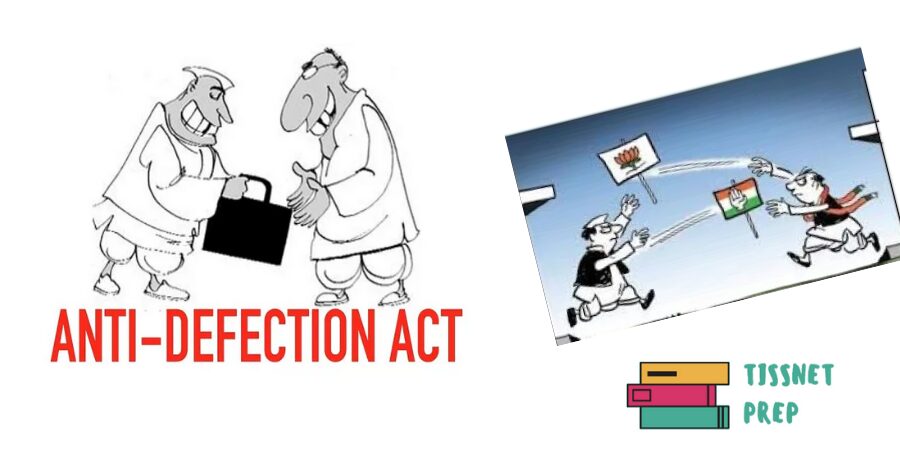TISSNET usually asked Static Questions relevant from the Current Affairs.Anti-Defection Law(ADL) has been into discussion lately because of many recent happenings and it has been into criticism. Let’s know about the history of ADL and how it has evolved in short.
Anti-defection policies were a good step to safeguard voter interest in a democracy, however, lately, the provision of 2/3rd representation as a whole defecting has set a dangerous precedent and therefore needs careful study.
ADL provisions and limitations
Current dimensions:
- Need for directive
- Importance of the directive
- Criticisms of the directive
Content:
ADL provisions and limitations:
- Through the 52nd Constitutional Amendment Act of 1985, the 10th Schedule of the Constitution, which contains the anti-defection law, was added to the Constitution.
- The purpose is to curb political defection by the legislators.
- There are two grounds on which a member of a legislature can be disqualified.
-> If the member voluntarily gives up the membership of the party: Voluntarily giving up the membership is not the same as resigning from a party. Even without resigning, a legislator can be disqualified if by his conduct the Speaker/Chairman of the concerned House draws a reasonable inference that the member has voluntarily given up the membership of his party.
-> If a legislator votes in the House against the direction of his party and his action is not condoned by his party, he can be disqualified.
An exception provided in the 10th schedule is, if there is a merger between two political parties and two-thirds of the members of a legislature party agree to the merger, they will not be disqualified.
Limitations:
- It affects the independence of MPs/ MLAs by curbing their freedom for speech and expression.
- Only the Speaker has the discretion to decide whether the resignations were voluntary or genuine. But there are many cases where speakers have not acted as impartial umpires on issues related to defection.
- Speakers aren’t legally bound to take a decision on any anti-defection case within a timeframe and this discretion has helped ruling parties on various occasions in several states.
Need for directive:
Though the law has been able to curb the evil of defection to a great extent, a very alarming trend of legislators defecting in groups to another party is visible.
The speaker who also belongs to a particular political party could be influenced by political interests. In many cases, the disqualification petition to be decided within a reasonable period of time has lingered on for an indefinite period.
(E.g. Recently the disqualification petition against seven of its MLAs had been pending at Nagaland Legislative Assembly speaker’s court for 10 months)
Proposed changes:
- Supreme Court urged Parliament to set up an independent permanent tribunal to decide disqualification petitions within a reasonable time.
- The Constitution would be amended to “substitute” Speakers of the Lok Sabha and Assemblies as “arbiter of disputes concerning disqualifications” which arise under the Tenth Schedule “with a permanent tribunal”.
- The tribunal could be headed by a retired SC judge or a retired chief justice of an HC or some outside independent mechanism to ensure that such disputes are decided swiftly and impartially.
- This move is done to give teeth to the anti-defection law instead of leaving it to the Speaker’s discretion who continues to belong to a particular political party either de jure or de facto.
Importance of the directive:
In Kihoto Hollohan (1992) case, the SC had upheld the validity of the anti-defection law and had also made the Speaker’s order subject to judicial review on limited grounds. It had made it clear that the court’s jurisdiction would not come into play unless the Speaker passes an order, leaving no room for intervention prior to adjudication.
In the Rajendra Singh Rana case of 2007, the constitution bench set aside the Uttar Pradesh Speaker’s order refusing to disqualify 13 BSP defectors on the grounds that he had failed to exercise his jurisdiction to decide whether they had attracted disqualification, while recognising a ‘split’ in the legislature party.
As “failure to exercise jurisdiction” is a recognised stage at which the court can now intervene, the court has thus opened a window for judicial intervention in cases in which Speakers refuse to act.
If the SC directive is followed without any constraints, it augurs well for the enforcement of the law against defection in letter and spirit.
Criticisms against the directive:
- Violates Separation of powers principle
- Violates Article 122 which bars courts from inquiring into the proceedings of the Parliament.
- Anti Defection proceedings fall under ‘ parliamentary proceedings.

